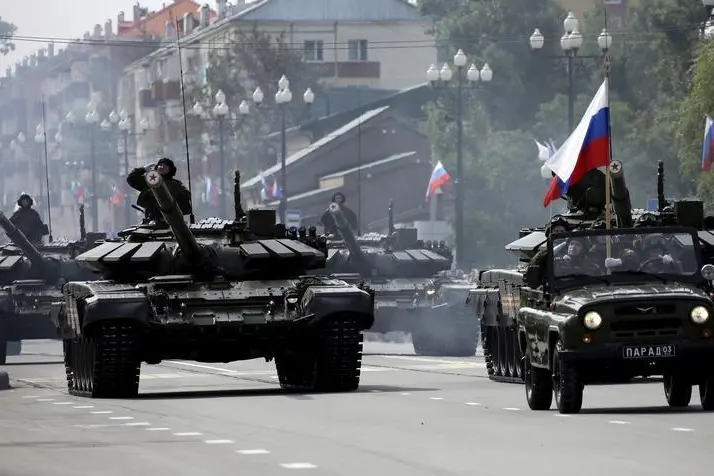PHOTO
(The opinions expressed here are those of the author, a columnist for Reuters.)
By Peter Apps
LONDON- It's been a mixed month for Russia and its military. In Syria, they took control of the former Islamic State capital Raqqa, strengthening their hand following the withdrawal of U.S. troops. In Ukraine, a new ceasefire should leave Moscow in control of territory it seized five years ago.
Meanwhile in Murmansk, its only aircraft carrier caught fire.
The fire on the Admiral Kuznetzov last Thursday, which killed one and injured at least 10 more, was only the latest mishap to befall the vessel. Earlier this year, it was damaged when a floating crane collapsed. Even at her most seaworthy – while conducting air strikes against Syria for example – her reliability clearly alarms Russian authorities enough to ensure she was always accompanied by a rescue tug.
This incident, alongside several other high-profile Russian accidents this year - including the death of 14 sailors in a nuclear accident on an experimental submarine - is a reminder of the paradox at the heart of Moscow's military might.
Three decades after the fall of the Berlin wall, Russia has rebuilt and demonstrated an ability to fight that intimidates its neighbourhood and beyond. Simultaneously, however, it still struggles with the basics of maintenance and manning.
Moscow might have won its five-day 2008 war with Georgia, but at home that conflict was seen as having highlighted problems within a military still reeling from its post-1989 collapse. That year, officials committed to replacing 70% of military equipment by 2020 and reforming personnel structures still heavily dependent on conscripts and in which many Cold War-era units were catastrophically understrength. Under the reforms, the number of units was dramatically reduced – and with them the number of senior officers - while Moscow looked to emulate major Western counterparts with the creation of a professional corps of noncommissioned officers.
COMBAT EXPERIENCE
Analysts inside and outside Russia have long disagreed on the effectiveness of these reforms, which have also looked to diversify and fix Russia's defence industrial base On one level, today's Russian military operates globally and often effectively on a scale unthinkable at the turn of the century. Syria in particular has given special operations troops and pilots additional combat experience, and ships and planes have operated as far afield as South Africa and Latin America.
Simultaneously, Russia has invested in several technologies that give its potential foes serious concern, including air defence systems that would make it extremely difficult for Western air forces to operate. That includes a new generation of missiles that prompted Washington to quit the Intermediate Nuclear Forces missile treaty earlier this year.
How credible much of that technology is – or how threatening – is a subject of disagreement, particularly amongst Western analysts. In September, U.S. analyst Michael Kofman wrote that Russia's anti-aircraft and missile threat had been "woefully overhyped", both in Europe and the Middle East.
Questions also remain over several of Russia's high-profile next-generation missile systems, including hypersonic weapons. In August, a mysterious explosion that killed five Russian scientists was widely reported to have been the result of a botched test of its nuclear-powered cruise missile, although later reports suggested the explosion occurred on a ship trying to recover another previously lost rocket.
Serious problems persist with personnel and equipment. Russia's military manufacturing campaign has been inconvenienced by the collapse of relations with Ukraine, once home to much of Russia's Soviet-era arms manufacturing capability. That has left Russia's latest frigates lacking engines amongst a string of other supply problems. Morale remains mixed at best. In November, the father of a conscript who shot and killed eight fellow soldiers on a base said he had been driven to it by bullying and the military tradition of "hazing".
WAGING WAR
Perhaps Moscow's greatest skill when it comes to its military has been knowing exactly where and when it wants to use it. For all its conventional army's problems, it is optimised for conflicts along Russia's immediate borders, giving it an advantage against Western forces with longer supply lines. From computer hacking to electronic warfare, Moscow has proved adept at fusing new and old ways of waging war.
In the first year of the Ukraine conflict in 2014, it showed it could integrate artillery firepower with cutting-edge target acquisition, often through tracking Ukrainian military radio or mobile phones.
That led to several Ukrainian battlefield defeats – but more lately, Ukrainian forces say they have become much better at frustrating Russia. By going on the offensive, they have often left Russian forces unable to coordinate, sometimes inadvertently shelling their own troops.
For Western analysts struggling to understand what Russian military power really means, perhaps that should yield the greatest lesson. Moscow's military might still be creaking at the seams, but it has learned to innovate. For its foes, that still makes it very dangerous.
*** Peter Apps is a writer on international affairs, globalisation, conflict and other issues. He is the founder and executive director of the Project for Study of the 21st Century; PS21, a non-national, non-partisan, non-ideological think tank. Paralysed by a war-zone car crash in 2006, he also blogs about his disability and other topics. He was previously a reporter for Reuters and continues to be paid by Thomson Reuters. Since 2016, he has been a member of the British Army Reserve and the UK Labour Party, and is an active fundraiser for the party.
(Editing by Giles Elgood) ((giles.elgood@thomsonreuters.com))





















